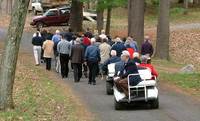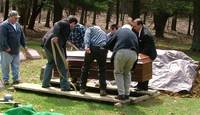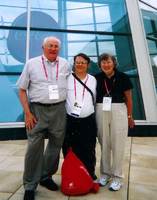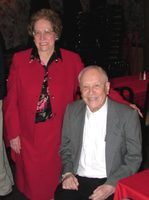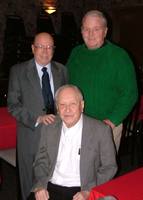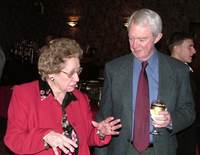Marists All May 2004
ISSUE # 76
The Tenth Marist Family Weekend
July 9-11, 2004
The Tenth Marist Family Weekend (formerly Marist Family Institute of Spirituality) is scheduled for Friday, July 9, through Sunday, July 11, at Marist College. This retreat-reunion, bringing together current Marist Brothers, former brothers, their spouses, widows, and friends, has re-created a bond generated through a common Marist experience. Although the aging process has claimed some of the regular participants through sickness and death, those remaining feel strongly about the sense of community, the vibrant prayer and liturgy, and the reconnection with those who have continued to live the religious life.
This July, the participants will begin the coming together on Friday evening through Saturday night with discussion and sharing, prayer and liturgy, within the context of the theme, “Rekindling Marist Spirituality.” This year our program coincides with the beginning of the Brothers’ Retreat. Br. Sean Sammon, who will be leading that retreat, has accepted the invitation to make a separate presentation to our group. We will also be able to join with the Brothers at dinner and at Sunday Liturgy. The participants of the Marist Family Weekend will be completing our gathering on Sunday evening, July 11. The Brothers will be staying on for the remainder of the week.
Readers of Marists All are invited to participate in this weekend gathering to renew friendships and to reconsider how Marist Spirituality might enrich their lives. If interested in joining us, send by June 15th a deposit of $25 to Br. Charles Marcellin (83-53 Manton St., Briarwood, NY 11435) with commitment to attend. Total cost of the weekend per person is $200 (per couple, $275). This includes cost of meals and accommodations. Pro-rated adjustments will be made for those who are able to attend only part of the weekend.
From WILLIAM BYRNE(’52): Having some errands in Grand Blanc, Michigan (about twenty-one miles from where I live in Clarkston), I decided to renew my acquaintance with Mike McGonigle. We had spent several years together teaching in Roselle. I had a good idea of the location of the school he’s been shepherding as principal for the past twenty-one years, so I decided to drop in on him unannounced.
Convinced that he would not immediately recognize me, sporting a more recent beard, I arranged with his office staff to go along with a ruse I devised. I had his office assistant announce me as a prospective Spanish teacher interested in working in the school. Fearful that he would brush me off with some inconsequential application form, I made sure his assistant made it clear to Mike that I insisted on speaking to him personally, and that I would accept nothing less. When Mike came out of his office and entered the open area where three of his staff pretended to be busy, they witnessed the following scene in which I was armed with my best imitation Spanish accent:
Bill: “Ju must geev me a job teaching Spanish!”
Mike: “We have a very good Spanish teacher on staff already.”
I paused to observe his perennially spit-polished shoes and continued.
Bill: “Ees it a man or woman who teached this Spanish?”
Mike: “A woman.”
Bill: “No. A woman cannot teach Spanish well. No, thees is no good!”
Mike (in his best politically correct voice): “I’m sorry you feel that way!”
At this point, I could not keep up the performance any longer, as the office staff had burst into laughter at my inappropriate remark. I then revealed myself, and Mike and I embraced in true Marist spirit. His office assistant opined that I “had made her day!” Mike and I then revisited our years as Marists and our teaching days at Roselle Catholic. We caught up on our families and promised at some time to get together with the other ex-monks in the area.
From GENE ZIRKEL(’53): The Marist Laity Conference (held in Boston in April) was terrific, far exceeding our expectations. The Brothers’ part had been noticed and remarked upon by several people, including Ann Browne, the Chair of the Marist Family Laity Service Committee. Wonderful presentations were given by Brother Leo Shea (“Marists in Action”), Barney Sheridan (“Living as a Marist in a Secular World”), and three young women who had served in the Marist Laity Volunteer program (“Attracting Young Adults”). We are grateful to Brothers Sumner, Brice and Hank Hammer for securing this latter group for us.
From SIMON ANTHONY (in a letter to Br. Joseph Belanger): “My wife and myself will work in the lay apostolic work as long as we can. At least three weekends in a month we go to faraway remote missions… At present our Catholics join other fundamentalists who pay money and various help to get this poor people into their activities. So we do our level best to prevent them joining there. Now our lay people have more responsibility to support the religious.”
From DON RYAN(’42): My years at Marist High are among the most truly happy I have been blessed with. We were just five or six Monks at the outset, and Bayonne was, and is, such a receptive and accepting town. What a joy it was to be able to start fresh with such wonderful boys! It was my first brush with “coaching,” too, and I reveled in my work as track coach, spending hours upon hours with truly great kids. When I attended the 40th reunion of the Class of ’59 five years ago, I was thrilled by the so very warm reception we received, those of us who had been privileged to teach these men, then boys. And to come to know their families! It was my last teaching assignment as a Monk. So, returning to Marist High in 1999 was a remarkable moment. I am humbled by the memory and yet cherish it as well.
From JOHN O’CONNELL(’58): The second annual “gathering” in Esopus took place from April 8th in the evening through the morning of April 10th at the Holy Rosary building thanks to our gracious host, Br. Don Nugent, ’59.
Just what are we up to? We are a unique group formed at the Prep, Tyngsboro, and/or the College, sometime between 1954 and 1962. This effort to make contact once again with guys with whom we shared those early life experiences really came about when David Kammer (once Master of Novices in Tyngsboro) and I met and talked about how Vinnie Hall ’58 (RIP) passed anonymously, with none of us there to mourn his passing, support his spouse, and at least acknowledge his existence among us. Because we missed him, my search for the rest of the group began. Early on we connected with Bill Reffelt (RIP), finding he had terminal lung cancer, and a few days later with Russ Therriault, to find that he had been in a coma for five months with not much chance of making it. Neither of them or their spouses had any support from many of the guys they had grown up with.
As I told Bill’s wife, Elaine, now at least 200 more people knew of his passing and mourned with her, their kids and grandkids. Eleven classmates even came from all over to be with him again, ever so briefly. As I told Russ’s wife, Shirley, never again would someone like her have to keep such a long and uncertain vigil alone, for want of at least a phone call or a note from one or more of his high school or college buddies.
This initial desire to connect led us to seek out any and all classmates from 1954 at the Prep through 1962 when our “group” graduated from the College.
How’d it go at Esopus? First, Br. John Nash (’59) joined us for dinner at the old Broglio’s: small “b” brothers Pete Kuveke, Bill Shannon and I. Others who stopped in that night and the next day included Br. Jim Stevens and Br. Vinnie Benedict from across the river. Raoul Molnar poked in for some conversation, as did Don Nugent and Mike Williams (all ‘59ers). Whoever stopped in made contributions to the easy friendship, mutual respect and affinity we all seem to have for one another. Big “B” Brothers joined to complete the challenge of boiling up sixteen freshly caught and transported Maine “laubstahs” for dinner.
On Friday we sat around the welcome fireplace in the living room for a semi-structured “life storytelling” to fill each other in on the last forty years or so: Jerry Byrne (would have been ’59); Pete Kuveke(’58) (who had flown in from Bradenton, Florida; Phil Hannigan ’60, who drove up from Ft. Meyers, Florida. Vin Poisella,’58, Jim Gargan, George Farrell, John “Maxie” McGalagly, and Tom Hourican also joined us. Frank Sutton (‘59) called in, but we lacked a speakerphone to mutually enjoy his comments. Jim Friel ’52, designated old timer, knew some of us from Lawrence in the old days.
And what about next year? We’re shifting our gathering dates from Holy Week to a couple of weeks after Easter Sunday (March 27, ’05). Too many of our brethren were involved with Holy Week services or had commitments for the upcoming Easter Sunday with family. We’ll let you know the particulars on our gathering in ’05. See you all then.
From JOE MADSEN(’62): This morning I received a package from the wonderful people of the parish of Mt. Carmel in Patchogue, NY where I ministered for close to five years. Along with different goodies came the latest issue of Marists All. I have just finished writing a general letter to friends and relatives; something tells me that maybe I am meant to send something to Marists All.
In 1997 I started working with Spanish speaking immigrants for the Diocese of Rockville Centre on Long Island. It was in the context of that work that I met Edmundo Abastoflor, the Archbishop of La Paz, Bolivia. The archbishop invited me to come to work in his diocese. In February of 2003 I left ministry on Long Island and departed for Bolivia.
By December, after ten months here in La Paz, I finally finished with the Ministry of Migration and all the fuss and bother of my move to Bolivia. On that same day I got my car, a VW Golf made in Brazil. Now I venture out into Bolivian traffic and hope my instincts get me back to where I started from… and without an accident. In large part the rules of the road here are summed up in the word “machismo”; I am much more accustomed to following the rules. Happily, I have no interest in traveling into the areas where traffic is heaviest. The bus system is fine for that.
As I write, it is summer in the southern hemisphere. Technically Bolivia is in the tropics, but here in La Paz we are three and a half kilometers above sea level. I look out across the valley up toward the altiplano where most Bolivians live, and I can see a snowstorm draping in white the upper reaches of the mountains. It has been a pleasant day with temperatures around 70, but suddenly it’s cold. Lightning and thunder brought a blast of cold air smashing my window wide open and sending my papers flying all over the place.
On the feast of the Immaculate Conception, the parish feast day, Father Max asked me to preach at all of the Masses. I think I did a good job, but as every teacher knows, it is hard to deliver the same message five times in a row with equal enthusiasm. On an ordinary Sunday here the display of flowers decorating the church would be considered lavish by American standards. On a feast, and during novenas leading to the feast, the display of roses and gladioli far outdoes the word “lavish.” When I got up to the lectern, I couldn’t see the people. I tried to move one vase and in the process knocked over two others. I made national TV that day. I was interviewed in the parish church on the meaning of the Immaculate Conception and why this celebration was taking place. I was surprised that they actually aired what I said. In North America there would have been a sound bite. …
In July of 2003 I was dispensed from my vows. I hope to be ordained a priest of the Archdiocese of Nuestra Senora de La Paz sometime toward the end of 2004.
From DON (Christopher Matthew) EDWARDS (’57): My main reason for writing is to congratulate senior and junior jubilarians, whose many names I amazingly remember. I would like to send warmest regards to Br. John Francis, Br. Joseph Maura and Br. Edmund Sheehan. If memory does not fail, Br. John was in charge of music at Tyngsboro when I was a postulant and novice. I taught with Br. Joseph Maura at St. Helena High School back in the sixties. Br. Joseph taught math and coached j.v. basketball, and I taught English and eventually Spanish. They were very special years, the richest of all my years of teaching. Br. Edmund Sheehan taught at Christopher Columbus in the late sixties. In addition, I think Br. Conan Vincent was principal of St. Helena’s when I was a student there in the early 50’s. I remember the time when he sent the whole school home early because half of the student body was soaked from crossing through the drenched fields to get to the main building on a stormy morning. I believe Br. Richard Shea also taught at St. Helena’s when I was there. Warmest regards also to the junior jubilarians who were seniors at the College when I was a sophomore.
I also wish to acknowledge the recent death of Br. Stephen Minogue. What a wonderful human being he was. His encouragement and friendship provided one of the many riches of my twelve years as a Marist. I was so impressed with his voice. He was so honest about how he was told that he would never be able to sing, and so he decided to prove his critics wrong. And here I am this year making my own singing debut. At my own recital I will pray to Br. Stephen rather than St. Cecilia, hoping not to make a fool of myself in front of family and friends! I will be singing a bass aria from Mozart’s “The Magic Flute”: “In diesem heilgen hallen….” Gutsy, if not borderline crazy!
Marist College Trivia: Why the Red Fox In a niche in the James A. Cannavino Library there is displayed a bronze replica of a sculpture of a Red Fox. Included in the display is the following explanation:
A 1961 meeting marked the adoption of the “Red Fox” as the official nickname and mascot of Marist College athletics. Br. William Murphy decided to organize a varsity basketball team to play scheduled games against other schools and that a nickname and logo would be appropriate.
While glancing at a sports catalog, Br. Murphy noticed a reynard, more commonly known as a red fox, on the cover of a book. He decided that this highly intelligent and ingenious little creature, indigenous to the Hudson Valley, would become the mascot and logo of all Marist College teams.
The (prominence of the) Reynard came from a great medieval cycle of stories that originated in the Low Countries, northern France, and western Germany. The rarity of the word prompted Br. Murphy to choose the general term “Red Foxes.”
Marist College is unique in that it is the only college or university to claim the Reynard or “Red Fox” as its mascot. The Marist “Red Fox” appears on each side of our coat of arms as well as the college ring. Our school colors, red and white, are derived from the coloration of the fox.
(The Editor wonders if students and staff who preceded this 1961 version might have another story, legendary or otherwise….)
In Memoriam
JACK CRAVEN (’48) (formerly Br. Timothy Joseph) on January 30, 2004 (age 75) (See Jim Kearney’s comments in the previous newsletter #75)
BR. THOMAS EDWARD HENNESSY(’40) (1920-2004) on February 13, 2004.
Prayers for the Sick
Br. Denis Hever (’64)
Francis (Barney) Sheridan (’55)
Bill Doherty (’62)
Brother Cornelius Russell ('45) (see photos below)
The remains of Brother Paul Ambrose Fontaine and Brother Thomas Edward Hennessy were interred in the Brothers' Cemetery at Esopus New York on Saturday 17 April 2004. Those attending were representative of the many publics these Brothers served in the United States, Italy, Asia, Sri Lanka, the Philippines ...
“A Revolution of the Heart”
Marcellin’s spirituality and a contemporary identity for his Little Brothers of Mary Brother Sean D. Sammon, FMS, Superior General
6 June 2003
(The following excerpts are intended to challenge our readers to rediscover the basis of Marist Spirituality that binds us together in a special way. They provide for us an opportunity for reflection and prayer. They offer us, even as lay partners with the Marist Institute, a firm basis for our relationships with each other. A full copy of the Circular may be obtained from the Marist Brothers Provincial Office, 1241 Kennedy Boulevard; Bayonne, NJ 07002; 201-823-1115. Editor)
The Purpose of This Circular: Directly and indirectly at our 20th General Chapter, our identity as a group and the central place that Marcellin’s spirituality must hold within that identity was an important theme.
A Point of Clarification: For the sake of style and focus, I have addressed this letter to my brothers in the Institute. I realize, however, that many of our lay partners will also have an interest in its message, and I do not intend to exclude them. Brothers, please feel free to share this letter with lay partners in your District, Province, or region and to include them in discussions about its contents.
Do We Have a Future? : (There are) three challenges; initiating a profound change of heart, by renewing their life of faith, leading to a greater centeredness in Jesus Christ; re-discovering their Institute’s founding charism, unencumbered by historic trappings; arriving at a transforming response to the signs of their times. I firmly believe that as we address these three tasks, we will discover that the spirituality of Marcellin Champagnat lies at the heart of any fresh and compelling identity for his Little Brothers.
God Dwelling at the Center: The founder’s last Testament identifies the three elements that make up the core of his spirituality and that of his Little Brothers: confidence in God’s presence, devotion to Mary and reliance on her protection, and the practice of these two uncomplicated virtues: simplicity and humility. … In Marcellin’s understanding of our faith, both Jesus and Mary were at the heart of the mystery of the Incarnation. So, we can say that while the founder’s spirituality was truly incarnational, it was decidedly Marial, too.
A New Identity for the Little Brothers of Mary: General Chapters since the time of Vatican II have been clear about this point: in forming any new identity for our Institute, we must address these three areas: prayer, apostolate or ministry, and community life. Our most recent Chapter also encouraged us to take up this work in union with lay Marists, eager to clarify their identity and having a keen interest in Marist mission and Marcellin’s spirituality.
Love of God as the Foundation: Eventually, the founder arrived at a point where he built his spirituality upon this solid base: love of God and of other people. He loved God in His very human nature. Outgoing by temperament, Marcellin also loved people and enjoyed spending time with them. Aware that God chooses to be revealed in the persons and events of life, the founder came to understand that one way to a loving relationship with God was through loving relationships with others.
Spirituality Defined: Brothers, call it a practical Christianity, call it what you will, but Marcellin Champagnat came to embody an incarnational spirituality. He knew from experience that an authentic spiritual life has its origin in the place and amid the circumstances in which we find ourselves. As he matured, each person the founder met became for him an image of the risen Savior whom he had come to know and love so well. … Spirituality has more to do with being grateful for the gift of God’s unconditional love than with any pious practice, and that stands to reason. After all, gratitude is the root of all virtue; it is the foundation of love and charity. Marcellin understood that fact; he invites us today to do the same.
Elements Shaping an Incarnational Spirituality Today: We realize that sexuality is much broader than genital sexual behavior, and includes also our way of being in the world as a man or woman, and the attitudes and characteristics, culturally defined as masculine or feminine, that we appropriate over time. More importantly, though, sexuality captures our basic human need to reach out, both physically and spiritually, to embrace others. It expresses God’s intention that we find in relationship what it means to be human and spiritual. Yes, sexuality is intrinsic to our relationship with other people and God. It has much more to do with self-transcendence than with self-fulfillment.
The Place of Mary: We as an Institute need a new appreciation of Mary: one in keeping with the teachings of the Second Vatican Council, and, at the same time, respectful of the varied and rich traditions that are so evident among us. … We love Mary, not because the Mother of God received exceptional privileges, but rather because she lived and suffered simply, like us, in the dark night of faith. Mary was a daughter of this earth; she had human passions, joys. She shared all the human concerns that we experience today.
Growing in the Spirit of God: In addition to embracing the Paschal Mystery and the twin habits of personal prayer and integrity in our moral life, what other practices did Jesus recommend and our founder use to foster a healthy spiritual life? Three in particular come to mind; one, a passion for justice; two, a grateful heart; three, involvement with an historic community of faith.
Concluding Remarks: This circular letter discusses but one aspect of our identity as Little Brothers of Mary, albeit the most important. The members of our 20th General Chapter challenged us “to center our lives and communities in Jesus Christ, like Mary, with passion and enthusiasm, and to implement processes of human growth and conversion which promote this.”
This 2003 photo of Jack Craven arrived too late for insertion in the last newsletter. He is shown with his wife and stepson in Rome Italy, where the family attended a conference on Down's Syndrome (Click here to read Brother James Kearney's letter about Jack in the previous newsletter
Brother Cornelius Russell celebrated his "21st birthday" on 29 February 2004 at a party organized by his sister Mary. Brother moved from the retirement home in Miami to Cabrini Rehab Center at 542 East 5th Street, NYC 10009. His sister Mary lives nearby. Visitors & phone calls to 646 654 0537are welcome.
Source: Original Marists All Site
Marist College | Marist Archives & Special Collections | Contact Us | Acknowledgements
